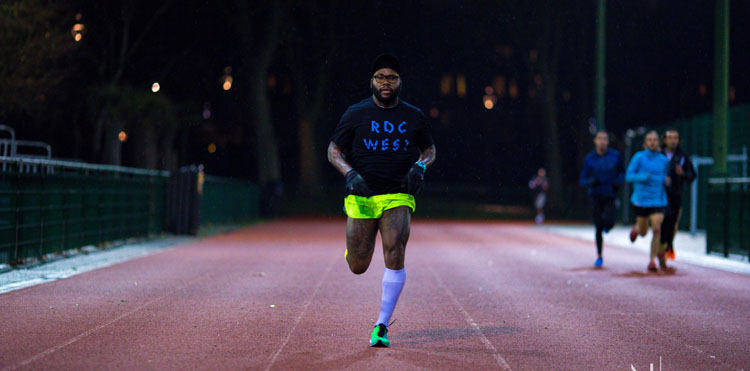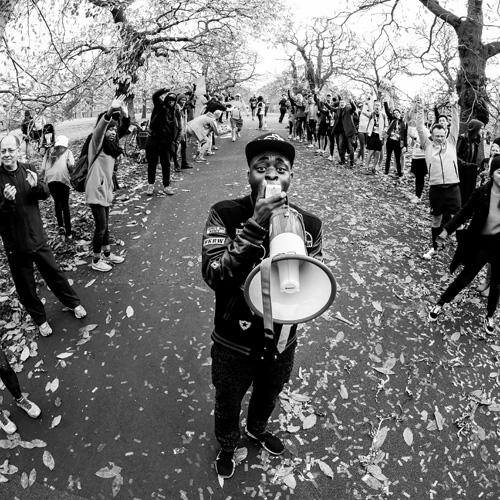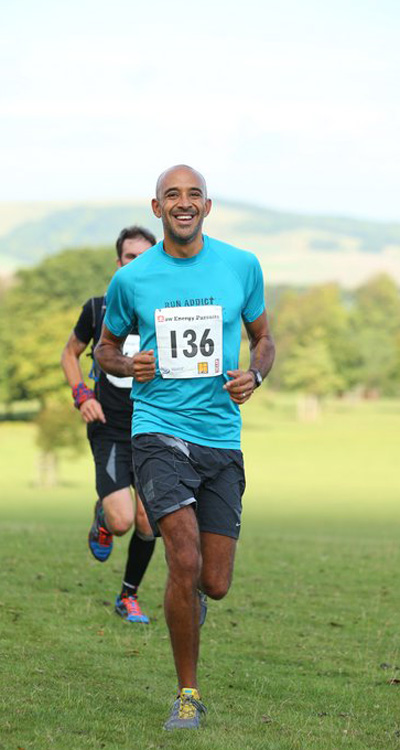Look around you the next time you line up in a starting pen. Scan the faces in the field. How many of them are black? Watch a major city race on the television and you’ll see the front end of proceedings dominated by black runners. Behind them, among the thousands pouring through the start line, the proportion of black runners will taper off to a minute figure.
Recreational running has exploded in the UK. Since 2010, marathons have sprung up in Brighton, Liverpool, Manchester, Milton Keynes, Sunderland and Yorkshire. Yet there is a yawning chasm in the demographic spread of people taking part in recreational running. Black men – and women, for that matter – are running in miniscule numbers. Sport England’s 2013/14 figures for participation show 2.9% of the black population in England take part in running at least once a week compared to nearly 5% of white British people. With regards to taking part in organised running, the data shows 23.4% for white British and no data for the black population, due to the data being unavailable or an insufficient sample size.
Charlie Dark, a Londoner and founder of alternative running group, Run Dem Crew, realised it as he started entering races.
“My very first race was a 5K in Battersea Park. I turned up, the car stereo was blazing, I was all hyped up to go and run this race,” he says. “I’d been training for this in secret, and I just felt really unwelcome.”
And so did Cory Wharton-Malcolm.
“You notice it immediately,” says the 36-year-old. “Any running club you go to, or any kind of race you go to – as a black man not only are you the minority, you are often the only black person there.”
Wharton-Malcolm, a sports development officer for Westminster Council, says:
“It’s about how it’s sold to you, how it’s packaged up to you in school. It’s sold as a punishment or something you do that hurts. That’s not the best way to sell it. It’s not sold as cool or exciting or fun, just this thing that you do.” Dark adds: “If you’re a black child, it’s automatically assumed that you’re quick. So if you’re not, it’s a really big wake up call. So I think kids get discouraged. As soon as they get to the point where they’re not the fastest person at school anymore, their love of running is over.”
That scenario, of course, can be true of more than just the black community. If you’re reading this magazine, your correspondent wouldn’t mind betting that there was a time in your life when
you didn’t run, or perhaps played other sports before discovering it. Dark, Wharton-Malcolm and Marcus Ryder, a 44-year-old journalist living in Glasgow, were all in the same boat for various reasons. It was when they entered the sport in their late 20s that this glaring absence of black people became apparent. And their travails in trying to find a setting where they could feel comfortable as they explored their new passion was about more than just the colour of their skin.
Ryder explains: “The people who went to running clubs and the activities they did afterwards, whether it’s going for a drink or whatever, didn’t appeal to me. So I was trying to find a club that suited my needs and had the kind of friends I would normally hang out with. And I struggled.”
Similarly disillusioned with traditional running clubs, Dark took it upon himself to create Run Dem Crew, an east London-based collective who explore the city and, crucially, attract a more multicultural crowd than traditional running clubs.
“As a DJ, the best parties I’ve ever played at are filled with people from all different walks of life,” he says. “As Run Dem Crew is based in London, and I see London as a big melting pot of different cultures, it’s important for me that we reflect that. I think that’s not consciously done; people are just naturally attracted to that. I think people who like to be in a room full of people, from different walks of life and different cultures, come to us.”
Wharton-Malcolm operates the west London branch of RDC. The fall-out, post-school, of young black runners is, he says, a missed opportunity.
“We’re definitely missing out on a whole load of talent, purely because people aren’t engaging these young people in the right way,” he says. “There are a couple of juniors I have come across who have no idea how much talent they have. I think there is a problem with coaches as well. If you look at the high-level coaches, they’re all from exactly the same demographic. You don’t have to be from the same background to motivate someone, but if you look at a group of people who are supposed to be representative of our sport and you only have one demographic, you’re not really getting enough balance, are you?”
What Wharton-Malcolm is referring to here is what, in academia, they call ‘whiteness’. Kevin Hylton, Professor of Equality and Diversity in Sport, Leisure and Education at Leeds Beckett University has studied ‘whiteness’ in sport in great depth.
“It’s a big issue,” he says. “For many people, it’s not something they see; it often goes unremarked. It’s not that people are telling you to go away, but it’s there, so there needs to be a recognition of the perceived whiteness of events.”
England Athletics have the ambition of making athletics, including running, the single most popular individual sport by 2017, and have targeted an increase of 500,000 weekly participants. Their 12-page plan to achieve it, entitled A Nation that Runs, identifies non-whites as a target group for new growth, stating: ‘Specific branding and programmes will be developed and adapted to ensure that we can target our work in the most effective way to meet the needs of the diverse communities we will work with.’
This document was published in 2013, and running participation, according to the Active People Survey carried out by Sport England, has shown an increase in people running since then. In the year from October 2013 to October 2014, the number of over-16s running for 30 minutes a week or more grew from 1.95 million to 2.08 million, and track and field participants rose from just under 92,000 to almost 108,000. There is an argument that to seriously move the dial for the non-white demographic that England Athletics has targeted, serious investment is needed of a level that has seen such exponential growth in female participation.
“Women had role models and it was sold to them as a lifestyle: there are apps left, right and centre to get women involved in sport,” says Wharton-Malcolm. “Everybody is invested in it. Are we going to see a similar level of investment to get a different demographic engaged?”
That’s the question people have to ask themselves. It’s a prescient time to ask it, too, as Sport England plough funds into their latest campaign aimed at women, This Girl Can. Perhaps women are an easier ‘win’ when it comes to hitting targets for growing participation. Perhaps, culturally and biologically, black men simply prefer other sports. Should anyone be trying to force them into recreational running?
“If we’d been having this conversation in the 1980s, we’d be saying exactly the same about women,” says Ryder. “I think you can definitely increase black participation. How do we send out those signals that say, ‘Come’? We don’t need Mo Farah on the cover of a magazine. We need to say, ‘This can be you.'”
But if young black men are naturally more interested in sprinting, does it matter that marathons are largely a white domain?
Ryder thinks it might: “There’s a problem with sprinting,” he says. “Generally speaking, you don’t do it as you get older. Black people suffer disproportionately from diabetes [Type 2 diabetes is up to three times more common among people of African and African-Caribbean origin] and one of the ways to address that is through diet and sport.”
Do events need to do more as well? The ballot system for the London Marathon gives one person as much chance as the next to win a place through the lottery.
Race director Hugh Brasher says: “Our event is predominantly made up of entrants from across the UK – not just London – and actually has a greater proportion of non-white British, Irish or West European participation than the UK population average. Our ballot system is entirely random and has no bias whatsoever. And it should be noted that the work of the London Marathon Charitable Trust has done a huge amount across the capital to encourage participation in sport through funding for facilities and initiatives.”
No one MR spoke to for this investigation sees the lack of black recreational runners as a racist issue.
It is “racialisation” that must be looked into, says Professor Hylton. “Until event organisations and national governing bodies recognise the perceived racialisation of their sport, they won’t understand how that turns people off,” he says. “Even if they feel they are welcoming, they need to recognise that they can’t be colour blind by ignoring how the dynamics within their sport work. I’m not saying what we have is a racist hierarchy, but it’s a hierarchy that doesn’t recognise the privileges of whiteness, because a privilege of whiteness is to be able to turn up to an event and see people like yourself and to feel welcome. For others, they could go to an event, look around and won’t see people like them and won’t necessarily feel welcomed from the off.”
One answer is for more Run Dem Crews, more Charlie Darks – who seems to have cracked the formula for the newly packaged version of running. “We had to build up a sub-culture alongside running,” he says. “We pulled in things like music, art and graffiti to get people attracted. What I don’t think the traditional running community understands is, if you don’t attract new people to your sport, your sport will stagnate.”
Join the Crew
Run Dem Crew is a collective of runners and creatives who meet every Tuesday to explore the streets of London – rundemcrew.com









